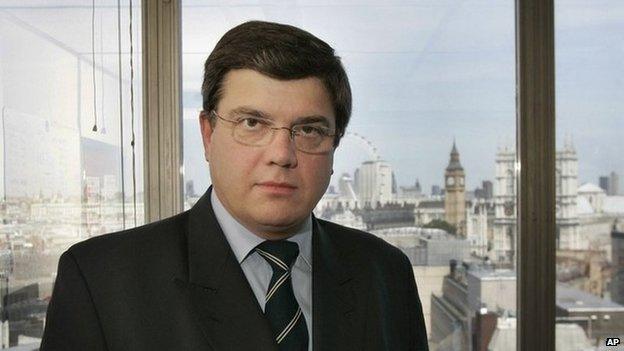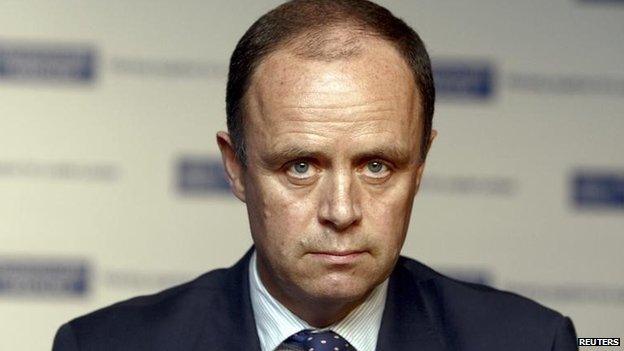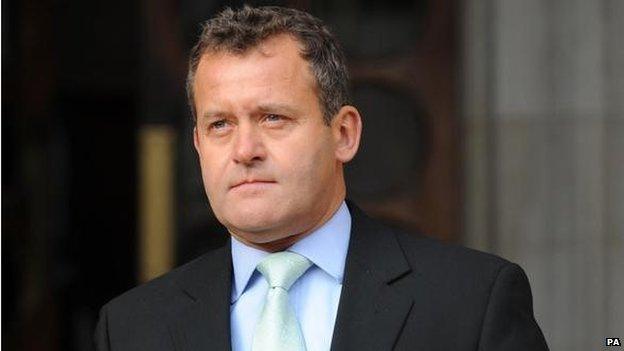Phone-hacking case: Why did it take so long to crack?
- Published

Former Anti-Terrorist Branch chief Peter Clarke oversaw the first hacking arrests
Scotland Yard in August 2006 - Peter Clarke, head of the Anti-Terrorist Branch (SO13), was a troubled man.
His department was responsible for investigating one of the biggest terror plots ever seen on the UK mainland.
The investigation, police code name Operation Overt, was a plot to take "liquid bombs" on to trans-Atlantic airliners and detonate them mid flight.
He also had another case on his desk - Operation Caryatid - an investigation into how journalists at the News of the World were listening in to voicemail messages on mobile phones belonging to members of the royal household.
Within a couple of days, in early August, Clarke had co-ordinated multiple arrests of the perpetrators of the terror plot in London and High Wycombe. His team had also cracked the royal case by arresting a private investigator, Glenn Mulcaire, and the royal editor of the News of the World, Clive Goodman.
While the eyes of the world were taking in the implications of a terror plot that would have been a catastrophe to rival 9/11, if it had been successful, Mulcaire and Goodman were being questioned by officers from SO13 - they would both be jailed after pleading guilty at the Old Bailey, for phone hacking royal aides, in January 2007.
Security concerns
Despite their successes the Met had a problem - should they widen the phone hacking investigation? They had seized 11,000 pages of documents from Mulcaire and knew that there were many more phone-hacking victims outside of the royal household.
The decision was made to close down Caryatid - the amount of resources required to properly investigate all of the material seized was deemed not justifiable.
Instead, a strategy would be drawn up to inform phone-hacking victims how their privacy had been invaded "where there might be security concerns".
Later, in his evidence to the Leveson Inquiry, Peter Clarke, an enormously capable and committed police officer, expressed his regret that the victim strategy was not implemented.
Considering that the victims included the deputy prime minister and two home secretaries, that failing now seems extraordinary.

John Yates said his decision not to reopen the investigation was a "poor one"
If the victim strategy had been implemented we may have found out much earlier that three of the 5,500-plus News of the World phone-hacking victims were princes William and Harry and the then Kate Middleton.
The young royals were named in the hacking trial that ended in the conviction of Andy Coulson who, as editor of the News of the World, was clearly obsessed with stories about the young royals.
The Met had another opportunity, after Caryatid, to reopen the phone hacking investigation. In July 2009 the Guardian newspaper revealed that News International had paid the head of the Professional Footballer's Association, Gordon Taylor, hundreds of thousands of pounds in compensation for hacking his phone.
Assistant Commissioner John Yates, who was now head of counter terrorism at the Met, was tasked with reviewing Caryatid and made the fateful decision not to reopen the phone-hacking investigation. It was a decision he described in his evidence to Leveson as a "poor one in the light of what we now know".
Royal privacy
What might have been behind that decision in 2009?
During the phone-hacking trial two very different people put forward their explanation.
Clive Goodman, a self-confessed royal phone hacker, told the court: "The police and the CPS had their own reasons to protect the discretion of the victims." The victims he was referring to were William, Harry and Catherine.
Andrew Edis QC, the urbane lead prosecutor, told the court - during mitigation hearings for five of the six men convicted as a result of the second phone-hacking investigation, Operation Weeting - that he would not criticise the conduct of Operation Caryatid but, at the time, there was "an acute concern about the privacy of the Royal Family".
There is, perhaps, another reason.
In November 2002, again at the Old Bailey, the trial of the former butler to Diana, Princess of Wales, collapsed.

The collapse of the Paul Burrell case left the police humiliated
Paul Burrell was accused of stealing from the late princess's estate but during the trial, in a dramatic turn of events, it emerged that he had told the Queen he was keeping some of Diana's possessions.
Celebrating his vindication outside court, Mr Burrell famously proclaimed: "The Queen has come through for me." The police and Crown Prosecution Service were humiliated.
Did Scotland Yard think twice about another high-profile royal-linked affair going to court? One experienced royal correspondent put it this way: "Police, the courts and royalty don't mix." The police officer in charge of the Burrell investigation was John Yates.
Much has been made of the relationship between senior officers at the Met and senior staff at the News of the World. In the trial we heard about Rebekah Brooks's meetings with whoever was the Met commissioner of the day.
In his evidence to Leveson, John Yates detailed how his friendship with former News of the World deputy editor Neil Wallis - who was, the trial told us, known in the paper's newsroom as "The Wolfman" - turned into a job offer as a media adviser.
However, no evidence has ever emerged that any of the decisions made by the Met over how to handle the phone hacking case has been influenced by those relationships.